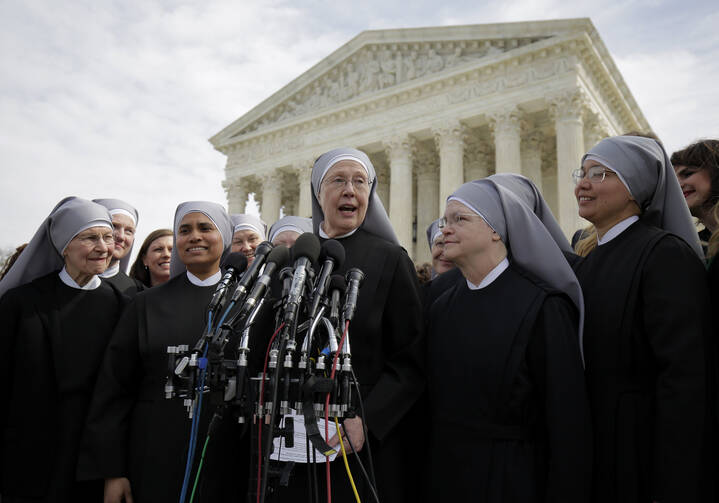The Catholic Church knows a thing or two about sin and moral complicity. The Supreme Court has far less experience. Nevertheless, in Zubik v. Burwell, a case argued on March 23, 2016, the sixth anniversary of the Affordable Care Act, its eight justices must determine the extent to which the church’s understanding of sin is protected by U.S. law. Specifically, the court must decide whether the accommodation provisions established by the government to protect religious objectors from mandated contraceptive insurance coverage are sufficient under the Religious Freedom Restoration Act (RFRA).
RFRA, passed in 1993, prohibits the federal government from placing a substantial burden on the exercise of religion unless the government has a compelling interest and has narrowly tailored its actions in the least restrictive manner. The litigants in the Zubik case are religious colleges and organizations, such as the Little Sisters of the Poor, who qualify for an accommodation, but not outright exemption, from the Affordable Care Act. They argue the HHS regulations, designed to give employees “seamless” healthcare, “hijack” the religious employers’ insurance contracts and implicate those employers in the provision of contraceptives and abortifacients. The government contends it has sufficiently minimized, if not completely eradicated, the burden on religious employers because it permits them to opt-out of providing and paying for contraceptives through a simple notification form. The religious employers counter that the opt-out provision does not relieve them from “collaboration” because the law still requires their insurance companies to provide contraceptive coverage to their employees.
The disputed regulatory and contractual provisions are exceedingly complicated and there is even some factual dispute regarding the logistics and legality of various proposed alternatives. It is impossible to tell from the oral argument exactly how the court will rule, although past decisions make it almost certain Justices Alito and Thomas will rule in favor of the Little Sisters and their co-petitioners while Justices Ginsburg, Kagan, and Sotomayor will rule in favor of the government. Chief Justice Roberts seemed inclined to accept the hijacking argument, which means he is leaning against the government. Justice Breyer seemed genuinely distressed at the prospect of discerning where to draw the line between a substantial and non-substantial burden on religion. It is more likely than not, however, he will agree with eight of the nine lower courts who drew that line in favor of the government. As in so many cases, the deciding vote rests with Justice Kennedy.
A tied decision would leave all the lower court rulings in place. That possibility, which would result in conflicting applications of the law depending on the geographic location of an employer, may encourage the justices to craft a creative compromise decision that would continue the controversy until a ninth justice is on the bench.








